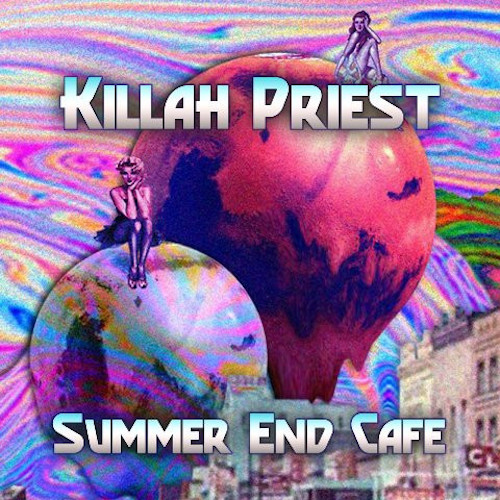“Cause the most damage, like freemason symbols in Disney
You believe it or not, like Ripley”
Everything Killah Priest ranges from apocryphal to apocalyptic. Often it’s both at the exact same time. That’s both the charm and the madness of listening to Walter Reed rap, although “rapping” is probably the wrong word for it. Sometimes he sticks to the beat and flows in a traditional way, but often he sounds like he’s performing spoken word extemporaneously. You get the feeling KP spends a lot of time thinking, but not necessarily a lot of time writing down the bars he thinks of. He uses his smoky, gruff voice like a jazz musician. Priest’s vocals float over the instrumental regardless of what’s going on in the background, almost completely ignoring their presence as he tells stories and spits prophecy.
“Wimbledon 1936” off “Summer End Cafe” exemplifies all of this, and it’s no coincidence it was released promotionally in advance of the album. The visual that accompanies it looks like an old Victrola player, and the music wouldn’t be out of place for the time and place in the title. The entire thing feels like it stepped out of Cuphead, but Priest’s rap sounds more like prohibition era bootleggers. He evokes the imagery of gangsters reveling in their illicit profits. “Oh what a good time everyone’s having fun/’til these masked men kicked open the door/came in with guns/one, shot the doorman in his head/Alcohol ran down his pants/The other tries to squeeze, but his trigger jammed.” The violence is far removed from the genteel feel that a famous tennis venue has tried to cultivate.
These are the type of contrasts that suit Mr. Reed best. The mellow, soft, breezy strumming of “Lady Barbara” mixed with Killah Priest flirting, until he wants an espresso and “a pizza/but I want mozzarella on croissant bread.” Would any chef or street vendor ever prepare something that way, even at the kind of carnival he references? Furthermore if the dough used for a croissant wasn’t shaped like a croissant, would it even be a croissant any more? This is exactly the kind of overthinking that Killah Priest’s rap style can lead to. His vocals are so strident and clear that they stick in your ear and make you wonder if what you heard makes sense. As the unnamed woman sampled in “Manuka Honey” says though, “We don’t have to fit in. Like we can just be ourselves.”
“Only the truth can heal/or maybe we need more weed farm skills/roll it and smoke it but we all on pills/Where did we go wrong? Nuclear bomb testing fields.” It never fails to captivate the listener, even if the audience who is listening to Killah Priest is completely out of step with what’s mainstream in rap. One of Reed’s most admirable qualities though is that he has no interest in fitting to that mold. Even at the height of his association with Wu-Tang Clan he always seemed like a square peg in a round hole, and when he collaborates with the likes of Canibus and Ras Kass he makes THEM sound normal and orthodox by comparison. Songs like “Super Mind” work because they absolutely wouldn’t work for anybody else other than him.
At times one feels Killah Priest could simply read off a grocery store list and it would be a compelling song. “A head of lettuce, two carrots and some orange juice/organic wheat bread sets my energy loose/I drink wheatgrass to rule all weak ass emcees.” I can even hear him saying it in his trademark whiskey soaked vocals. It could be said Priest gets away with a lot because of how intoxicating listening to him is. Other rappers couldn’t get away with doing what he does and he’s definitely not a man whose style is imitable. Rap only needs one Walter Reed though and I’m glad to see him still being his unconventional self after all these years. If radio rap bores you “Summer End Cafe” is the perfect antidote.

